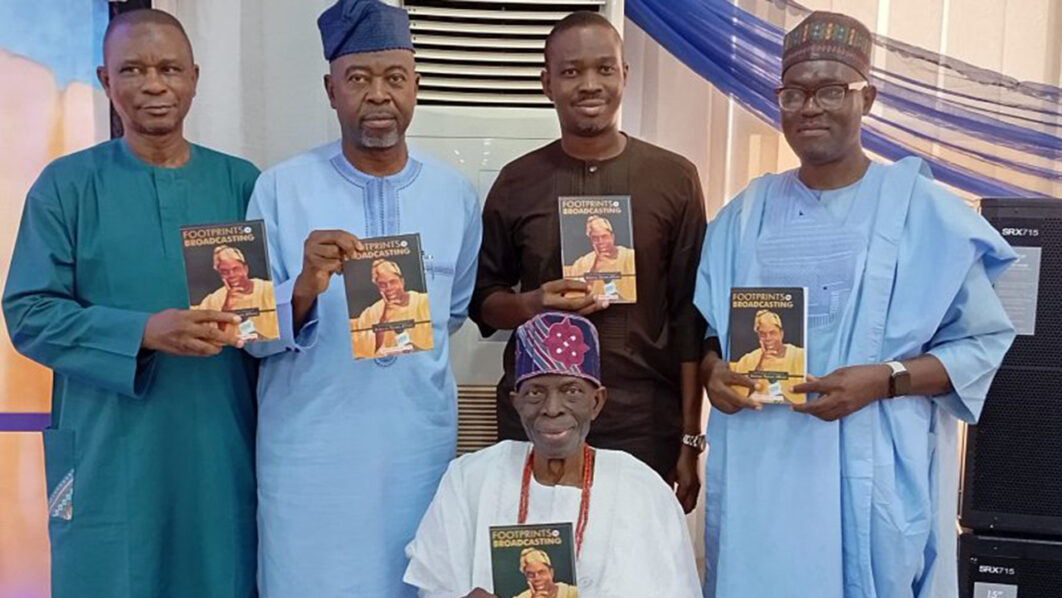
Veteran broadcaster and former Director General Voice of Nigeria (VON), Taiwo Alimi, has stressed the need for serious media regulatory agencies to enhance professionalism.
Alimi stated this in his book titled, Footprints in broadcasting. The book was written by former Chairman Lagos State Chapter of the Nigerian Union of Journalists (NUJ) Qasim Akinreti.
The biography was launched in Lagos recently to commemorate Alimi’s 80th birthday. To Alimi, “today’s media is compromised and this owes largely to the bad system of approving licences for those who want to establish media organs.”
Looking at the print media, he observed, “there is no serious regulatory agency for” it in Nigeria. He added, “if you talk of electronic, radio and television, it is the same thing. Therefore, media organs are all compromised today. How this can change is to have serious media regulatory agencies. As long as we don’t have that, people would not have correct information about public affairs that affect their lives.”
He recalled, “when I was with NTA Channel 10 in Victoria Island around 1979, I was very happy. First, it was a Federal Government organisation and I had a week night programme called, Lagos Report (Monday to Friday), where every night, I did a critique of the Federal Government parastatals and policies that were bad. Gen. Olusegun Obasanjo was the military Head of State and people were saying how come a Federal Government organ was so critical of initiatives that were bad? Gen. Obasanjo called my bosses, Dr Christopher Kolade, the late Ambassador Segun Olusola and Vincent Maduka, to Dodan Barracks and told them that they should remove me from the programme. They asked him why and he said I was embarrassing them by critiquing their programmes and policies. Kolade then asked him to tell them where I had lied on air, and he said, “no”. Then they said if Alimi was telling the truth, you should learn from that and make the necessary corrections. That was the leadership of the industry, not now.”
Former Governor of Ogun State Oluegun Osoba described Alimi’s contributions to broadcast journalism as immeasurable. Osoba also commended Akinreti for writing the biography, with emphasis on Alimi’s rightful place in the history of Nigerian broadcasting. In his review, Prof Saheed Timileyin of Lagos State University described Alimi as an icon in the broadcasting industry.
He urged readers to view the book beyond academic material, noting its value for students of mass communication and media professionals. Written in a simple, non-technical, yet non-pedantic style, Timileyin noted, “the work promises to be a pleasant reading for all thinking minds. Though the book can be read in different ways, I have chosen not to review it as an academic work, but as a moral and motivational resource material. The author attempts in this narrative to defreeze modern man’s “mental frozen food ideological packages” that have led to the social and moral disorientation of many young professionals in the contemporary world.
Reflecting on the social biography of Aremo Taiwo Alimi, Akinreti proposes in this slender volume a philosophy of achievement and a psychology of success that can inspire young professionals in any social universe in which they may find themselves.
The Speaker of the Lagos State House of Assembly, Mudashiru Obasa, who was represented by the General Manager of Radio Lagos, Olajide Isiaka, commended Alimi for his mentorship and guidance during his early years as a broadcaster.A scholar of communication and media studies, Tunde Akanni, lauded the author of the book for a commendable work while the celebrant is still alive.
General Manager of News Central, Kayode Akinyemi commended Alimi’s tenacity and passion for the job, sharing personal anecdotes of Alimi’s guidance.’ The author, Akinreti, disclosed the book is an exploration into Alimi’s public assignments in various spheres of life. To Akinreti, “it is my hope that this book will be an inspiration to the younger generation of broadcasters.”






